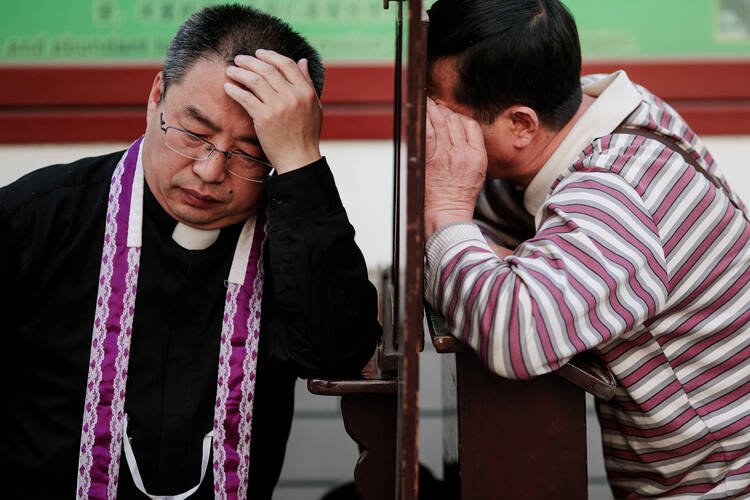HONG KONG (CNS) -- An 83-year-old Chinese bishop was installed in a state-sanctioned church ceremony June 9, the third bishop to be recognized by the communist regime since the Vatican and China signed an agreement in 2018 on the appointment of bishops.
Bishop Peter Lin Jiashan was officially installed as head of the Fuzhou Diocese in Fujian province, reported ucanews.com. Since 1997, Bishop Lin had refused to register with the government, and thus had not been recognized by Chinese authorities.
Bishop Joseph Cai Bingrui of Xiamen in Fujian province presided over the ceremony. About 40 priests and 80 Catholics from Fuzhou Diocese attended, reportedly because of restrictions against gatherings because of the coronavirus pandemic.
Fujian province's Ethnic and Religious Affairs Department said that, after the ceremony for Bishop Lin, Bishop Cai delivered a congratulatory speech on behalf of the Catholic Patriotic Association and the Chinese Catholic educational administration committee of the province.
Father Wang Yuliang, an official of the state-approved bishops' conference in China, read a letter of approval from the bishops' conference.
Bishop Lin, 83, pledged to obey God, fulfill the pastoral duties of a bishop and proclaim the Gospel to lead Fuzhou Diocese. He also vowed to be an active member of the Chinese Catholic Church.
The bishop's statement also said priests and Catholics should abide by the constitution of the country, uphold national unity and social harmony and love the country and the church.
The statement also insisted Catholics follow the directions to "Sinicize the church in our country" and contribute to the realization of the "dream of a great rejuvenation of the Chinese nation."
A Fuzhou priest who requested anonymity told UCA News that the diocese has more than 100 priests but only about 40 could attend the ceremony because the COVID-19 pandemic is "not yet over in the area."
"The number of people who could attend the ceremony was limited," he said, adding that attendees were selected after discussion among priests.
However, some sources told UCA News that the entire diocese had not accepted Bishop Lin's public installation. Another local source told ucanews.com at least one-third of diocesan priests have not signed the government document for civil registration of the clergy "because they were worried about the diocese's future."
The details of the Vatican-China agreement on bishops, which has always been described as "provisional," have never been released, but it is reported to be valid only for two years unless renewed before September 2020, reported ucanews.com.
The nomination and assignment of bishops was a key sticking point in Vatican-Chinese relations for decades; the Catholic Church insisted that bishops be appointed by the pope, and the Chinese government has maintained that would amount to foreign interference in China's internal affairs.
Catholic communities that have refused to register with the government and refused to follow government-appointed bishops commonly are referred to as the underground church; Bishop Lin had been one of those bishops.
Many communities, though, have had bishops who were elected locally but who pledged their unity with and fidelity to the pope, which in effect meant they were recognized by both the government and the Vatican.
When the Vatican approved the 2018 agreement, Pope Francis lifted the excommunications or irregular status of seven bishops who had been ordained with government approval, but not the Vatican's consent.
The first bishop to be recognized by China following the Vatican-China agreement was Bishop Zhuang Jianjian of Shantou, in January 2019. He retired immediately. Eight days later, China recognized Bishop Jin Lugang of Nanyang.










